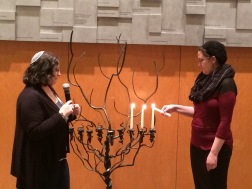
Melissa lights the Chanukiah at JCC Manhattan with her fellow intern.
As I’ve mentioned, I have the immense honor of interning at The Center For Jewish Living at JCC Manhattan this year. I also have the honor of interning alongside a woman getting smicha at JTS who recently shared about a project she was asked to do for a class which I assigned myself — write an essay describing your rabbinic calling and putting it in a textual framework. So while this is in no way an essay, it is my reflection on that prompt – or at least what resonated with me afterwards.
—
We learn in Pirkei Avot that Avraham had ten tests, but the mishna is deliberately vague about what exactly those were. (I don’t like using the word test in this discussion, which I am pretty sure I have already written about, so I’m going to use the word trial from here.) Rambam brings a list based entirely on psukim, which resonates with me more than the options which rely more heavily upon midrashim.
Maimonides lists Avraham’s trials as follows:
1. God tells him to leave his homeland to be a stranger in the land of Canaan.
2. Immediately after his arrival in the Promised Land, he encounters a famine.
3. The Egyptians capture his beloved wife, Sarah, and bring her to Pharaoh.
4. Abraham faces incredible odds in the battle of the four and five kings.
5. He marries Hagar after not being able to have children with Sarah.
6. God tells him to circumcise himself at an advanced age.
7. The king of Gerar captures Sarah, intending to take her for himself.
8. God tells him to send Hagar away after having a child with her.
9. His son, Ishmael, becomes estranged.
10. God tells him to sacrifice his dear son Isaac upon an altar.
That tenth test is Avraham’s true hineni moment. The moment he can no longer ignore the calls, and begins to accept his relationship with God and his future as a leader of the Jewish people.
One of the most profound things I learned in looking at all the various iterations of this list, is how many of the trials were not so clear in the moment, but upon reflection become easily placed into the list.
That’s how I feel about my rabbinic calling.
There are so many moments throughout my life that were calls, some were very clear, but others were less so. And ultimately, I too had my hineni moment, the moment at which I could no longer ignore the calls and took a moment to really hear Hashem.
Interestingly, when I stopped to really think about them, I too had ten moments of feeling a call.
1. Before my Bat Mitzvah when I fell in love with being in shul, leyning, and leading tefilla. (Also, when I first began exploring feminism and what it meant to me in a Jewish context.)
2. Constantly being told as a teen that I’d be a great rabbi.
3. Debating what graduate school to attend and whether to do a dual degree at once or to wait and decide how to expand my MSW after completion.
4. Spending an entire conference with a small group of rabbinical students, and one of them saying “give me a call when you change your mind about becoming a rabbi.”
5. Reaching out to what I thought would have been the best choice rabbinical school for me and not hearing back. {It is a particularly good thing that this happened, since I ultimately left the Conservative movement.}
6. Embracing the “rebbetzin role” (and subsequently starting this blog) after meeting and marrying my husband, and continuing on our evolving religious path. (And having all those people who told me as a teen I’d be a great rabbi nodding their heads.)
7. Meeting Dr. Sharon Weiss-Greenberg in Denver, who was then the Director of Recruitment for Yeshivat Maharat and first planted the seed.
8. Meeting Rabbi Avi Weiss the first time, where he casually mentioned attending Yeshivat Maharat while my husband attended Yeshivat Chovevei Torah.
9. Listening to a podcast of a panel of future Maharat’s at Stanton St Shul while walking to Nishmat where I was falling more in love with text study every day.
10. An initial skype meeting with the esteemed and beloved Rosh Yeshiva, Rabbi Jeff Fox.
Once I was able to really stop and hear the call, to accept that this was where I was meant to be, answering hineni was the only choice. It was reflexive and instinctive, just as I imagine it was for Avraham. I had no idea what coming to Yeshivat Maharat would really mean. I had no idea just how difficult it would be on so many levels. I also had no idea just how rewarding it would be on so many levels. But I knew I had to say it. And I know I have to continue saying it.
Hineni.
Hineni.
Hineni.
